Today, August 18, marks the 100th anniversary of the adoption of the 19th Amendment to the Constitution of the United States, guaranteeing women the right to vote. We honor that momentous event with an excerpt adapted from the chapter on women’s rights in Dr. Shermer’s 2015 book The Moral Arc. PLUS: in Science Salon # 129, Michael Shermer speaks with Mona Sue Weissmark about her book The Science of Diversity which uses a multidisciplinary approach to excavate the theories, principles,…
Tags
-
browse by topic
morality
eSkeptic for August 18, 2020
Fat Man & Little Boy

On the 75th anniversary of nuclear weapons, Dr. Michael Shermer presents a moral case for their use in ending WWII and the deterrence of Great Power wars since, and a call to eventually eliminate them.
eSkeptic for August 7, 2020
In SPAS-005, the researchers asked, “Do attitudes about language differ by political party affiliation?” PLUS: On the 75th anniversary of nuclear weapons, Dr. Michael Shermer presents a moral case for their use in ending WWII and the deterrence of Great Power wars since, and a call to eventually eliminate them.
The Moral Arc: How Thinking Like a Scientist Makes the World More Moral
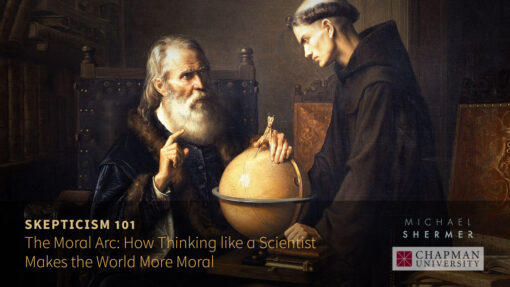
In this, the final lecture of his Chapman University Skepticism 101 course, Dr. Michael Shermer pulls back to take a bigger picture look at what science and reason have done for humanity in the realm of moral progress. Watch The Moral Arc: How Thinking Like a Scientist Makes the World More Moral.
eSkeptic for July 3, 2020
In this, the final lecture of his Chapman University Skepticism 101 course, Dr. Michael Shermer pulls back to take a bigger picture look at what science and reason have done for humanity in the realm of moral progress. Watch The Moral Arc: How Thinking Like a Scientist Makes the World More Moral.
Pathways to Evil, Part 2

In his lecture on Pathways to Evil (Part 2), Dr. Michael Shermer fleshes out the themes of Part 1 by exploring how the dials controlling our inner demons and better angels can be dialed up or down depending on circumstances and conditions. Are we all good apples but occasionally bad barrels turn good apples rotten, or do we all harbor the capacity to turn bad?
eSkeptic for May 15, 2020
In his lecture on Pathways to Evil (Part 2), Dr. Michael Shermer fleshes out the themes of Part 1 by exploring how the dials controlling our inner demons and better angels can be dialed up or down depending on circumstances and conditions. Are we all good apples but occasionally bad barrels turn good apples rotten, or do we all harbor the capacity to turn bad?
Pathways to Evil, Part 1
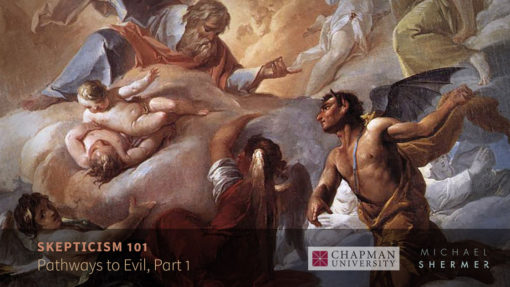
In his Skepticism 101 lecture on Pathways to Evil (Part 1), Dr. Michael Shermer considers the nature of evil in his attempt to answer the question of how you can get normal civilized, educated, and intelligent people to commit murder and even genocide.
eSkeptic for May 8, 2020
In his lecture on Pathways to Evil (Part 1), Dr. Michael Shermer considers the nature of evil in his attempt to answer the question of how you can get normal civilized, educated, and intelligent people to commit murder and even genocide. PLUS, this weekend only, Skeptic magazine back issues (in print or digital formats) are on sale for only 99 cents each!
Katherine Stewart — The Power Worshippers: Inside the Dangerous Rise of Religious Nationalism
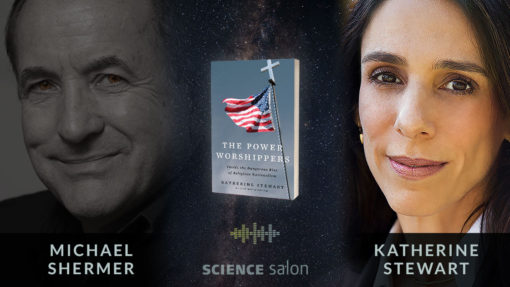
For too long the Religious Right has masqueraded as a social movement preoccupied with a number of cultural issues, such as abortion and same-sex marriage. But in her deeply reported investigation, Katherine Stewart reveals a disturbing truth: America’s Religious Right has evolved into a Christian nationalist movement. It seeks to gain political power and to impose its vision on all of society.
eSkeptic for May 5, 2020
In Science Salon # 114, Michael Shermer speaks with Katherine Stewart about her new book The Power Worshippers: Inside the Dangerous Rise of Religious Nationalism. PLUS: Frank S. Robinson reviews The Tyranny of Virtue: Identity, The Academy, and the Hunt for Political Heresies by Robert Boyers.
Brian Greene — Until the End of Time: Mind, Matter, and Our Search for Meaning in an Evolving Universe
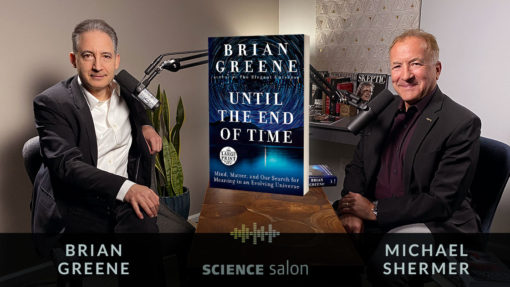
Until the End of Time is Brian Greene’s breathtaking new exploration of the cosmos and our quest to find meaning in the face of this vast expanse. Greene takes us on a journey from the big bang to the end of time, exploring how lasting structures formed, how life and mind emerged, and how we grapple with our existence through narrative, myth, religion, creative expression, science, the quest for truth, and a deep longing for the eternal.
eSkeptic for March 17, 2020
In Science Salon # 108 Michael Shermer speaks with Brian Greene about his book Until the End of Time: Mind, Matter, and Our Search for Meaning in an Evolving Universe. PLUS, during the Coronavirus outbreak, while many schools are closed, Shermer shares one of his Chapman University lectures, taught remotely, free for everyone to view.
Is a Good God Logically Possible?

In this excerpt from his book Is A Good God Logically Possible? (New York: Palgrave Macmillan, 2019. Pp.xi, 209.) James P. Sterba provides his answer to the question: “Is there a greater good justification for God’s permitting significant and especially horrendous evil consequences of immoral actions?”
eSkeptic for March 3, 2020
In Science Salon # 106 Michael Shermer speaks with Daniel Chirot about his book You Say You Want a Revolution? Radical Idealism and its Tragic Consequences. PLUS: An excerpt from Is A Good God Logically Possible? by James P. Sterba.
How Would You Design a Code of Conduct?

Carol Tavris avers that organizations’ Codes of Conduct that try to specify each and every possible behavior they wish to prohibit (or encourage), will find themselves in linguistic and psychological quicksand.
eSkeptic for February 18, 2020
In Science Salon # 104 Michael Shermer speaks with Judith Finlayson about her book You Are What Your Grandparents Ate: What You Need to Know About Nutrition, Experience, Epigenetics and the Origins of Chronic Disease. PLUS: Carol Tavris avers that organizations’ Codes of Conduct that try to specify each and every possible behavior they wish to prohibit (or encourage), will find themselves in linguistic and psychological quicksand.
The Crooked Timber of Auschwitz: A brief history of how a concentration camp became an extermination center

On the 75th anniversary of the liberation of the Auschwitz death camp, Michael Shermer and Alex Grobman present a brief history of how a concentration camp became an extermination center.
eSkeptic for January 26, 2020
On the 75th anniversary of the liberation of the Auschwitz death camp, Michael Shermer and Alex Grobman present a brief history of how a concentration camp became an extermination center.
Geoffrey Miller — Virtue Signaling: Essays on Darwinian Politics and Free Speech
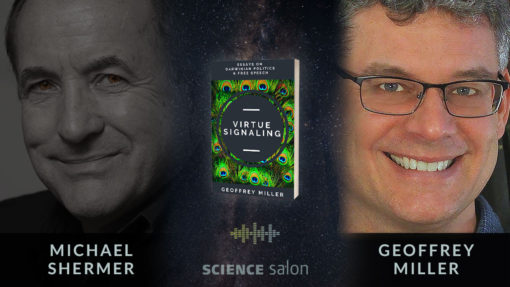
Shermer speaks with the polymathic polyamorous sapiosexual classically liberal evolutionary psychologist Geoffrey Miller about virtue signaling and why we all do it, how it works, why it’s not a bad thing, how it became a derogatory political meme, the role of virtue signaling in the evolution of the moral sentiments, and more…
SKEPTIC App
Whether at home or on the go, the SKEPTIC App is the easiest way to read your favorite articles. Within the app, users can purchase the current issue and back issues. Download the app today and get a 30-day free trial subscription.










